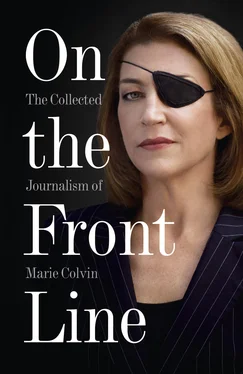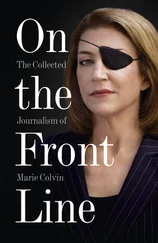John Simpson of BBC Television said in his understated manner: ‘The Americans have 2,000lb bombs which could make things extremely unpleasant.’
Latis Jassim, the information minister, arrived and reassured us. ‘You are safe. This is a commitment on our part. We are willing and eager to offer you the necessary services so that you can report the facts as you see them. But at no time will communications fail completely.’
It was midnight. We went back to the hotel. The attack could come at any moment. Nobody knew how bad it might be. We waited.
I took a small bag down to the bomb shelter below the hotel, just in case. Already women and children were huddled along the walls wrapped in blankets. Somehow the warning had swept through the hotel.
The lights in the shelter flickered. I had to see what was happening. I turned and started up the steps but was met by a flood of panicked people coming down the stairs, women with crying children, Sudanese waiters still in uniform, an Iranian delegation staying at the hotel.
At entrance-hall level, I could hear booms from outside. Upstairs, from the fifth-floor BBC office, we saw out of the window a spectacular display of tracer fire shooting across the sky. Tracers spewed up as if from a Roman candle. Others shot across the sky as if following an unseen and unheard enemy. White flashes illuminated the tops of buildings on which, during the last five months, we had watched the crews of anti-aircraft guns shelter first from the August sun and lately from January’s rain and cold.
Strange video game noises filled the air. The staccato thud-thud-thud of heavy artillery sounded. Bob Simpson of BBC Radio had a microphone out of the open window and leaned on his elbows on the windowsill as he calmly described the spectacular display. Down the hall, a CBS cameraman knelt on the floor, his camera out of the window, and filmed through a down-tilted eye scope.
Huge yellow flashes appeared on the horizon. Something to the right thudded and the impact threw me back across the room. Smoke rose from the building. There could no longer be any suspicion that it was a false alarm or jittery anti-aircraft gunners. It was 2.35am Iraqi time and Baghdad was under attack.
Doyle, spotting the flashes on the horizon, narrated for those of us less knowledgeable about armaments. ‘Those are the big boys, the cute 2,000lb bombs,’ he said. ‘Unfortunately I’ve been through this before. They are just pounding the hell out of that place.’
The bombing appeared to be about 20 miles off, probably at the Rashid military complex. The attack slackened off, then started again at 3.35am. The city, which had remained lit up, went completely black. The anti-aircraft fire stopped and started again in almost 15-minute intervals, sometimes directed above our hotel, filling the skies but seeming to have little effect.
About 4.25am, hotel security guards came into the room and tried to drag us downstairs to the shelter. They settled for taping over the emergency light that had gone on when the hotel lights failed. From below, during a lull, an earnest ABC reporter yelled up: ‘What are your departure plans?’ Somebody yelled down: ‘Up in the air at the moment.’
I wandered back to my room at 6am as dawn broke and the attack appeared to have stopped. A man I had never seen before was asleep in my bed still wearing large boots. I went down the hall and took a nap on the floor of the BBC office.
Morning came cold and misty again when I woke at 7.30am. After the drama of the night, it was strange to see the city skyline unchanged. Smoke from a fire behind the hotel drifted through the hallways. But little damage was visible from the hotel room. We clustered around to hear Baghdad radio for the first communiqué of the war. ‘This is communiqué number one. The mother of battles has begun. President Bush will regret this attack. Victory is near.’ The voice announced the immediate call-up of reserve soldiers born in 1954, 1955 and 1956. The radio returned to martial music.
My driver had disappeared. He was born in 1955 and had been worrying about the call-up for the last month. ‘War is very bad,’ he had said to me. ‘I fought eight years in the war with Iran. No wife, no children. Now maybe I have to go to Kuwait.’ His fears had been realised.
I grabbed a taxi on the street and drove around the city. The first evidence of attack was at the international post and telecommunications building. It had been hit by at least four missiles that had left gaping holes and dangling wires. Chunks of building and glass littered the streets, but no surrounding buildings suffered damage more than broken windows.
A bit further on, the Ba’ath party headquarters had taken a direct hit in the roof. Again, no surrounding buildings were touched. On Abunawas Street, across the river from the presidential palace, a car tilted crazily into a 30-foot crater already filled with water. But, other than that, there seemed to be almost no damage to civilian targets.
Anti-aircraft guns sounded again at 9am and 10am. Soldiers in uniform lined the roads at bus stations trying to flag down cabs or cars to head south to register with their units. The few families that had left it too late to leave stood, suitcases and children in hand, trying to do the same.
At 10.30am I was standing in front of the ministry of information, now deserted despite the minister’s brave words just hours earlier, as a thud sounded and a mushroom of smoke went up from the defence ministry about half a mile away. Two more thuds shook the building. Neither a plane had been visible nor an engine heard. Anti-aircraft fire went up but it was too late.
Driving by the ministry – an old Ottoman building still marked the Abbassid Palace on tourist maps and so secret that a government official once told me it was a museum – I could see flames in the central section. A wing had been flattened as if by a giant fist.
The reaction from soldiers in the barracks across the street from the defence ministry was as surprising as the suddenness of the attack. They stood standing and watching the fire as if it was a show unconnected to them. Nobody seemed to be in much of a hurry to put it out. Like the foreign ministry, the defence department must have transferred its operations elsewhere in the days before the deadline.
As I drove around town, the calm and lack of panic were impressive. Orderly lines formed for bread and cars queued for petrol. It was a far cry from the day after the bombing of the Libyan city of Tripoli, when Libyans crashed their cars into each other trying to flee, the government disappeared and rumours that Colonel Gadaffi had been overthrown filled the capital.
Baghdad’s militiamen had appeared overnight to keep order. In the Amriyah area, a civilian neighbourhood, six teenagers dressed in jeans and jackets walked along the streets with Kalashnikov assault rifles casually slung over their shoulders. A man in a cheap suit and a keffiyeh Arab headdress manned an anti-aircraft gun placed in the bed of a Nissan pick-up truck at a crossroads. But there were no new checkpoints, nor was there hostility towards foreigners.
Saddam came on Baghdad radio at 12.40 in the afternoon, speaking in calm and confident tone: ‘At 2.30am the great duel started. The valiant sons of Iraq, your brothers, sons and fathers, confronted the invaders. Damn King Fahd, the traitor of Mecca, damn the invaders, damn these criminals. We shall win. The dawn will break and they will be damned.’
My taxi driver, taking me back to the hotel, said he was not at the front because he had a piece of shrapnel still in his head from the Iran war. It hurt when the weather got cold. Like most Iraqis that day, he appeared worried but unfazed. ‘I did not think we should have taken Kuwait,’ he said. ‘I don’t agree with this. But the Americans should not come to Iraq. Iraqi soldiers will fight for Iraq and for Saddam. We have fought for eight years against Iran and they cannot frighten us.’
Читать дальше












